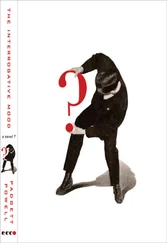“My wife is of no concern to me, masseur,” Mario said. “I would call some of my large girlfriendship if I had not lost my address book in the burglary.”
The Frenchman pursed his lips and gave Mario a squinty look he had seen somewhere before. For a moment he thought it was just more of his confusing voices and faces, but then it came to him. Paul Newman had given such a look to a bull at close range in Butch Cassidy and the Sundance Kid. The Frenchman was mocking him! It was beyond the imagination. He had not known the French to be fans of Paul Newman. And the Frenchman was not even careful to pretend to be curious about the burglary. He wasn’t curious, obviously, because he knew about it! You do not say “the burglary” and have normal, innocent people just sit there. It was the best evidence he had that the Frenchman was the very person of large size his cheerful wife was walking hill and dale to find, and this explained why she had been seen near them all day. It was fantastic, but Mario had become the paid escort to the man his wife was leaving him for, and all day he had been keeping the man just out of her reach. It was too much. “It just goes to show you,” Mario said aloud to no one in particular. “In this world, one word says it all.” He had heard this useful line from an American baseball player of Latin extraction. The ballplayer had actually said, “In America, one word says it all,” but Mario figured if one word said it all, it said it all wherever you were. If there was such a thing as universality, this logic was sound. He wished the ballplayer had gone on to say what the word that said it all was.
Mario planned to strike the Frenchman, but he was going to have to be careful that the Frenchman did not somehow survive the blow and sit on him. Large size was actually an inadequate description of the Frenchman. He was mozzafiato —take your breath away.
“Jerry Lewis is not an international comic genius,” Mario announced suddenly and loudly. At this, both Germano and Adriano Buffala stood up and assumed crouched positions not unlike runners before the start of long-distance races. But the Frenchman, who had been rummaging briefly in the toolshed beside the hospitality patio, waved Mario off with a gesture of impatience. He emerged from the shed with a shovel, and after quartering about the patio a bit came to a spot he seemed to find significant, and with all his weight sank the shovel into the ground. He stood on the flush tangs of the shovel with a look on his face knowing and confident. Germano and Adriano took off, and Mario casually strolled to his Fiat before firing it up and making haste away from the advanced Frenchman and the vineyard full of stories.
Mario had no idea how to contend with a large Frenchman who did not care if you insulted Jerry Lewis. The idea even frightened him a little. One might as well be dealing with a Moroccan, or worse. A Frenchman unprepared to defend Jerry Lewis might do anything at all, because he would be a man who was empty inside, perhaps not even a man in the normal sense but a kind of alien — an anti-homme, as he thought the French might put it.
Mario’s imagination was not equal to the prospect of the empty Frenchman. A non-Jerry-Lewis-loving frog gave him chills, in fact. He rolled up the cab’s windows and had a calming talk with Cicciolina, whose tette —if it were possible — had, since the day before, assumed an aspect of greater lift, greater heaviness, greater size. She was a marvel, l’onorevole Cicciolina, and he was gladdened at that moment to be a modern Italian. It gave you a sense of well-being to have one of your own kind in high places. In a way, though not in an entirely rational way, it was not unlike having your mother run the country. It was like turning the country into a home, a home into a bed, a bed into a passion of large size.
Mario discovered his wife at table before a plate of steaming pasta. She looked undisturbed, serene, even — if you could imagine it — happy. That was like her. She had the most developed capacity for self-delusion of any woman Mario had ever known.
She was even wearing house slippers. Thus she had thought to take off and conceal whatever kind of magical running shoes she had worn for the day’s incalculable mileage. She spoke pleasantly to Mario, who waved her off and searched the house thoroughly for these supernatural shoes.
In the course of his search, he located, in his nightstand drawer where he always kept it, his black address book, which contained the ninety-five names and numbers of his girlfriends. Some of these, Mario admitted, were untried. He had copied them from the secret rosters of local convents. It was absurd to just write all these girls off because they were pursuing a celibate life. Not all of them would become nuns, some would necessarily fall by the wayside, and these girls would be fresh and full of desire. It was like kinetic and potential energy, if you wanted to be scientific about it. Mario’s notebook was a trove of potential female energy. The notebook was where it had always been, and where it had not been the night before, following the burglary. His wife, for some odd reason, must have taken it with her on her failed, foolish quest for larger size.
He seized the book and intended to confront her with it, and with the absurd note she’d left about his not knowing beans about large size. He would walk into the steamy, happy kitchen full of her weird fantasy and slap both of these documents on the table and tell her that her fantastic lack of sense was at an end.
But he could not locate the note, and the address book alone did not somehow seem sufficient. A notebook of ninety-five girlfriends’ numbers presented defiantly to a wife seemed vaguely not the perfect thing. It spoke of the kind of damning evidence presented by one side in a court of law that eventually somehow works to the advantage of the other. He left the notebook in the drawer. He would get Cicciolina’s number and that would make it ninety-six.
He sat down to eat with his wife, who served him cheerfully. She was a marvel of deceit. She then had the temerity to ask him how his day had gone.
“You are fantastic,” he told her.
“Thank you, Mario.” She blushed. She blushed. In their previous, honest life together, she always blushed when he complimented her, and here she was counterfeiting the same complex physiological response. Anyone who could do that, under circumstances of running off for larger size, was worthy of Hollywood in Mario’s opinion. Or was crazy. She was either as good as Katharine Hepburn or she was gone. Either way, he had lost his wife. It was perfect, a situation that made perfect sense: he was sitting across from his smiling wife, who had fixed them an excellent meal and was solicitous of him and his petty workday, and he was smiling back, and anybody looking in their windows — as Mario certainly now knew people with black hearts did — would think them happily wed. But the party with the black heart could not see that his smiling wife had said he knew no beans about large size and had spent a night and a day running around cheerfully looking for it and had lost her mind.
Mario ate normally, the food was her best (wouldn’t it be?), and they retired and had a relationship in which his wife was especially ardent (wouldn’t she be?), and Mario forced himself to satisfy her. But he plotted throughout the relationship (it took some time, because his size did not want to be really large — how could it?) to go the following day to see Sevriano Buffala about his wife. He distrusted psychiatry — in his view you were either crazy or you weren’t, like pregnancy — but he loved the person who had been his wife, and it was worth pursuing the fantasy of modern medicine for the chance of bringing her back to earth.
Читать дальше












